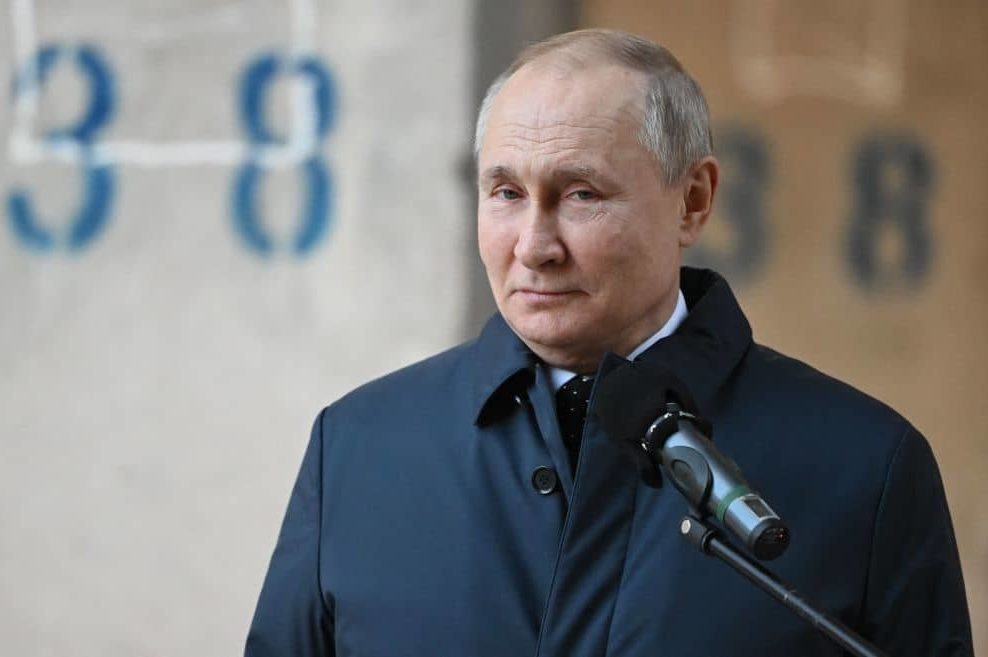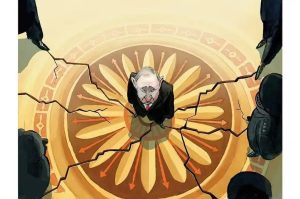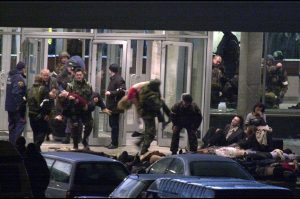Could an assassin kill Putin? Just as World War Two would not have happened without the demonic will and agency of Adolf Hitler, so the invasion of Ukraine — and its horrific bloodshed and unspeakable human misery — is Putin’s war. Can he be stopped? The chances do not look good at the moment.
Putin is protected 24/7 by one of the world’s strongest security details, who have sealed him in a closed bubble. All access to him is strictly — almost manically — controlled, in much the same way as it was for Stalin and Hitler. The chances of a lone outside assassin like Fanny Kaplin — a Jewish Ukrainian woman, who, in 1918, fired three bullets into the Bolshevik leader Lenin, touching off a series of strokes that crippled and eventually killed the Soviet dictator — getting to the dictator are zero. If Putin is to be stopped, ousted, and arrested or assassinated, the authors of such an attempt will have to come from within the clique who surround him.
Desperate times spawn desperate remedies, and only when the clique think that their own futures are directly imperiled by Putin’s increasingly dangerous actions are they likely to act.
Putin has already publicly humiliated members of his inner circle by berating them when they have raised the mildest of questions about his actions. They cannot have much affection for this supremely unlovable man. But will their growing doubts about him overcome their fears for their own futures?
History is replete with examples of successful assassinations carried out by the intimates of dictatorial rulers. Julius Caesar was, of course, killed by members of the Roman Senate; numerous Roman emperors like Caligula were murdered by their Praetorian guards, and at least one — Claudius — was probably poisoned by his own wife Agrippina. In modern times, King Faisal of Saudi Arabia was killed in 1975 by his own nephew, while India’s prime minister Indira Gandhi was gunned down in 1984 by her Sikh bodyguards, outraged by her attack on their holy Golden Temple in Amritsar.
Nearing the end of his thirty-year rule, a sick and aging Stalin had become so psychotic that he had arrested and was torturing his own doctors on suspicion of poisoning him, and was threatening the lives of his cronies and colleagues in the Soviet Politburo. There is considerable evidence that one of them, the chief of the Soviet secret police and security services, Lavrenti Beria, acted ruthlessly to save his own skin by actually poisoning his boss — appropriately enough with the rat poison warfarin — triggering the stroke that ended Stalin’s dreadful life on March 5, 1953. Beria himself proudly boasted of the deed, telling his comrades: “I did him in! I saved all your lives!”
Speculation about Putin’s assassination might seem presumptive, but, as the distinguished historian Professor Michael Burleigh demonstrated in his 2021 study of assassination through the ages Day Of The Assassins, the killing of political leaders from Julius Caesar to the present day has been a far more common way of giving history a helpful nudge than elections or abstract social and economic developments.
When all decision making has been concentrated in the hands of a single all powerful ruler, as with Putin, only the physical removal of the tyrant can end the tyranny and lift the danger that he is posing. But perhaps we should be careful what we wish for. Lenin’s untimely death paved the way for the rise to supreme power of Putin’s role model, Joseph Stalin.
Assassinations can also start wars — most famously with the killing of Austria’s Archduke Franz-Ferdinand by Gavrilo Princip in 1914 that precipitated World War One — but they can also end them. Had either of the two bombs that came close to killing Hitler in November 1939 and July 1944 succeeded in their aim, there is little doubt that World War Two would have finished earlier and millions of lives would have been saved.
Less well known, but possibly more pertinent to president Putin in his current circumstances, with his close knowledge of Russia’s history, is the successful killing of Czar Paul I at St Michael’s Castle in St Petersburg in March 1801. Like Putin, the increasingly eccentric and isolated czar had alienated the circle of military and civil officials surrounding him by his erratic foreign policy decisions. Their discontent culminated in a conspiracy which ended with them entering Paul’s apartment and strangling him. He was succeeded by his son Alexander I who eventually ended Paul’s alliance with Napoleon and brought the rampaging French emperor down.
So if the close circle of generals and corrupt yes men on whom Putin’s power rests are sufficiently alarmed by the increasingly chaotic course of the Ukraine war and the world’s horrified reaction to it, is there the faintest chance that they will take a leaf from the playbook of Beria and Czar Paul’s officials and end the crisis by bumping off their boss?
As the options open to the kleptocrats and and former secret policemen who Putin has protected and promoted close down, and the rage of the Russian people themselves rise, the best hope for ending this crisis may well rest with bad men acting to bring down the still worse and possibly deranged dictator who is leading them and Russia into the abyss.
Putin once told a journalist in a filmed interview that he had learned a valuable lesson about power in his youth when he cornered a rat in the apartment block where he grew up. Instead of submitting, the rat leapt at his face and attacked him. Is it time for the rats in the Kremlin to learn the same lesson?
This article was originally published on The Spectator’s UK website.

























